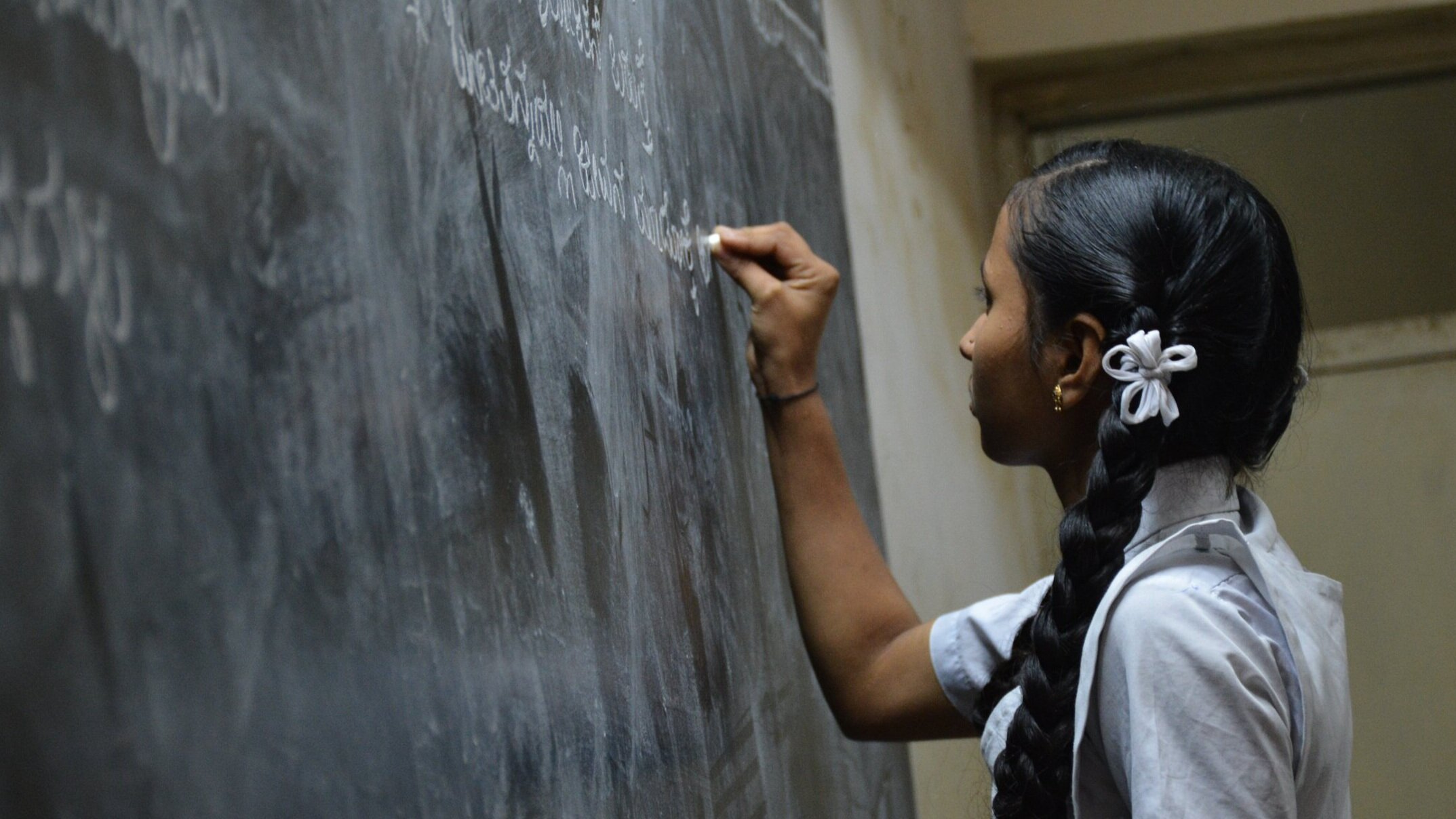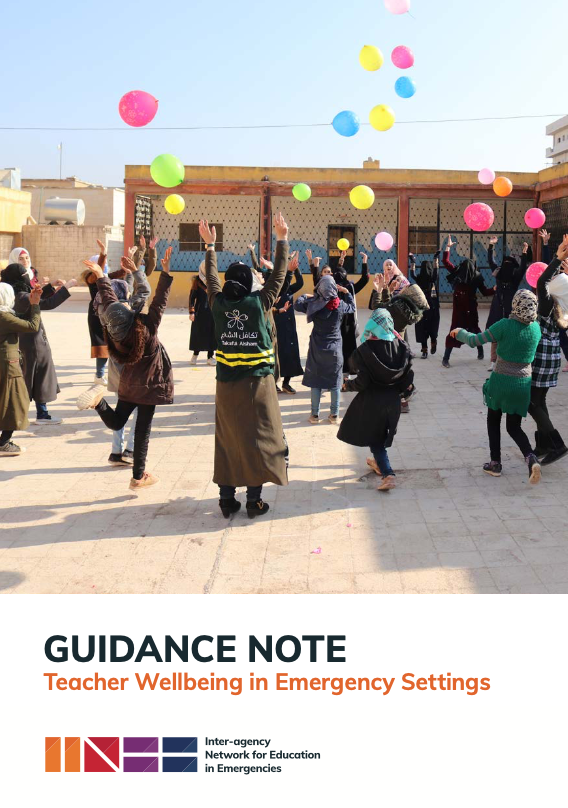
Published work
2024 (Forthcoming) - UNESCO. Teacher wellbeing and the shaping of teacher shortages in crisis contexts; Background paper for the UNESCO Global Report on Teachers. (Author)
Supporting the production of UNESCO’s inaugural Global Report on Teachers, I authored the background paper focused on teachers work and wellbeing in crisis-affected settings. My paper defines for a global audience of policy makers and teacher advocates the different types of crises in which teachers work and the various profiles of teachers by employment type, qualification status, and by experience of displacement. I look at how conflict and gender norms compound the already challenging realities of teachers work, and I draw from INEE case studies in Colombia, Kenya, Myanmar, and Palestine to demonstrate how data on teacher retention and attrition is often masked by national-level reporting on attrition averages for SDG 4.6.c and inadequate or non-existent indicators for teacher attrition. As such, I call for more nuanced data collection and reporting mechanisms to understand and track teacher shortages in crisis-affected settings.
See the full UNESCO report here. The background paper will be published mid 2024.
2023 - Journal on Education in Emergencies. Bangkit Semangat—Raise the Spirits: Teachers’ Vulnerability, Resilience, and Voice in Post-disaster Indonesia. (Author)
Based on an ethnographic study with teachers who experienced the 2006 Yogyakarta earthquake in Bantul, Indonesia, this article contributes to a nascent body of literature on teachers’ work, their vulnerability and resilience, and the importance of their voices during emergencies. As Marchezini (2015, 370) states, “It is necessary to look at survivors not merely as affected people, but as subjects with their own cultures and coping strategies.” With insights from teachers’ own narratives and the recurring concept of bangkit semangat (raise the spirits), I contend that the absence of teachers’ voices from global policy and guidance means that we have an inadequate understanding of teachers’ agency and fail to recognize their potential to realize, reimagine, and rework global recommendations at a local level.
2023 - NORRAG Global Education Center and the Geneva Graduate Institute. Refugee Teachers: The Heart of the Global Refugee Response. (Editor)
Refugee teachers and teachers of refugees play a vital role in providing education to refugee children and youth and by contributing in myriad ways to refugee communities. In many contexts, refugee teachers are at the heart of humanitarian response efforts. And yet, refugee teachers are all but invisible in global and national refugee and education policies, strategies, and frameworks. In addition, they face significant challenges in terms of recruitment, recognition, compensation, and professional development, which in turn contributes to high rates of attrition within this vital workforce. In recognition of these facts, NORRAG has brought together 48 authors from academia, humanitarian agencies, and think tanks to produce 27 papers that showcase current evidence and offer policy directions to prioritise and protect the work and well being of refugee teachers everywhere.
Launched at the UNHCR Global Refugee Forum in Geneva, December 2023. See the publication here.
2023 - Inter-agency Network for Education in Emergencies. Facilitation Guide: Teacher Wellbeing in Emergency Settings. (Author)
This resource provides program planners and facilitators with a comprehensive background to the Teacher Wellbeing in Emergency Settings project, the documents that inform the conceptualization and design of the regional contextualization, policy, and practice workshop, as well as the overarching philosophies that inspire a recommended approach to facilitation in conflict-affected contexts.
It also offers reflections and recommendations from the pilot of this workshop, which took place in Ramallah, Palestine, in August 2022. This guide is not designed to be prescriptive; it is expected that each facilitator will bring their own knowledge, insight, and expertise to a review, reworking, and revision of this workshop design in order to fit the unique cultural and learning needs of the context they work in.
2023 - UNHCR, UNICEF, and Plan International. The Missing Piece: Secondary Education in Crisis Contexts.(Lead Author)
This publication, ‘The missing piece’ , provides an overview of secondary education in crisis contexts, highlighting the current issues, challenges, and thematic areas that help or hinder adolescents’ access to quality learning opportunities. It is an evidence-informed, analytical, and high-level summary of current debates and tensions in the field, and is intended to be read by government leaders, humanitarian sector policy makers, and practitioners to guide and support advocacy and decision- making processes. In light of the significant evidence gaps in what is a dynamic and urgent field of inquiry, this briefing also helps shape a future research agenda that brings much needed attention to the sector.
2023 - Current Issues in Comparative Education. More girls are accessing school, but are they achieving? An exploratory study of the factors influencing girls’ mathematics achievement in Pakistan. (Co-Author)
With my co-authors, we conducted an ordinary least squares regression to analyze Pakistan’s TIMSS 2019 data to examine the effect of gender on mathematical achievement. Results show that despite overall inequity in access to education for female students, girls outperform boys. However, using Amartya Sen’s human development theory as an analytical lens, we found that while mathematics achievement might contribute to instrumental freedoms via the attainment of numeracy, discriminatory gender norms deny a vast majority of Pakistan's girls and young women the substantive freedoms central to their development. As we report, in Pakistan, the reality that young women are still 75 percent more likely to be disengaged from further education or employment presents a missed opportunity and significant cause for concern.
2022 - Teachers College, Columbia University. Navigating Ethical Dilemmas in Education in Emergencies (EiE): A Compendium of Vignettes for Research & Practice. (Contributing Author)
In conducting program, research, and/or evaluation activities in the education in emergencies (EiE) field, individuals may find themselves unprepared to address the ethical dilemmas that inevitably arise in these settings. To bridge this gap, a group of researchers, practitioners, and graduate students contributed to a curated collection of 18 short vignettes based on the real-life challenges and ethical dilemmas they faced working across different national contexts.
By integrating real-life scenarios, this compendium aims to strengthen and support emerging and future researchers and practitioners’ skills and readiness to identify, reflect on, and mitigate current and future ethical dilemmas accompanying educational research and programming in EiE settings.
2022 - Inter-agency Network for Education in Emergencies. Teachers in Crisis Contexts: Promising Practices in Teacher Professional Development. (Co-Editor)
Authored by researchers, practitioners, and policy-makers working in education in emergencies, the 42 case studies in this publication showcase promising practices in teacher professional development, well-being, management, and school leadership that represent a diversity of contexts, organizations and teacher profiles.
This second edition includes eighteen new case studies, alongside twenty-four from the first edition published in 2019. It provides teachers, practitioners, policymakers, and donors with compelling examples of programs and practices that positively influence improvements in teachers’ work conditions and teaching practice.
2022 - Inter-agency Network for Education in Emergencies. Guidance Note: Teacher Wellbeing in Emergency Settings. (Technical Director & Co-Editor)
This Guidance Note gives policy makers and humanitarian practitioners practical advice on how to support teacher wellbeing in the five domains of INEE’s (2010) Minimum Standards. It explains how to: promote mental health and psychosocial support (MHPSS) for teachers; create more enabling work environments for teachers; and enhance teacher voice, agency, and leadership in crisis contexts. It also offers key actors resources and tools and examples of these standards in action.
This INEE Minimum Standards-aligned Guidance Note is an opportunity to put teacher wellbeing at the center of response and recovery efforts in conflict and crisis affected settings. Not just because an investment in teachers is an investment in children and adolescents, but because at this moment in history teachers deserve our unparalleled attention as an end unto itself.
2021 - Inter-agency Network for Education in Emergencies. Teacher Wellbeing in Emergency Settings: Findings from a Resource Mapping & Gap Analysis. (Technical Director & Co-Editor)
The Teacher Wellbeing Tools & Resources Mapping maps the existing body of work on teacher wellbeing by collecting existing resources, tools, and policy or advocacy documents that address teacher wellbeing in emergency settings and presenting them in one place. The gap analysis report captures the findings from the resource mapping, and presents a set of 13 key recommendations to guide the next phase of the project where INEE will create new practical guidance and tools that focus on teacher well-being through a social-ecological lens in consultation with teachers themselves.
2021 - LEGO Foundation. Teacher Professional Development & Play-based Learning in East Africa: Strengthening Research, Policy, and Practice in Ethiopia, Tanzania, and Uganda. (Co-Author)
This white paper presents findings and recommendations for improving teacher professional development with a focus on play-based learning pedagogies. Drawing on an extensive literature review and numerous key informant interviews with practitioners and policymakers, the report examines the tenets of good teacher professional development (TPD) in humanitarian and development contexts, discusses the challenges to implementing good TPD, and highlights the key actors who influence teachers’ work.
2020 - UNICEF. Gender-responsive Education in the Context of COVID19: Framework and Progressive Standards for South Asia. (Author)
Despite promising progress towards universal primary and basic education, the number of out-of-school children in South Asia was staggering even before COVID19. This framework highlights the gender-responsive strategies and actions that can be carried out at school and in alternative education settings for building on the pre-pandemic political momentum for equal, equitable, and inclusive education opportunities for all children in South Asia.
2020 - UNICEF & UKAID. Leave No Girl Behind Webinar Series for South Asia: Thematic Review. (Author)
Set against a decade of significant progress in girls’ education in some South Asian contexts, and acknowledging the pervasive challenges for the region’s girls, this document is a brief but important summary of the thematic priorities explored throughout the 2020 Leave No Girl Behind webinar series. It shines light on the emerging and potentially long‑lasting impact of COVID-19 on the education, employment and health prospects of vulnerable, marginalized and excluded girls.
Drawing upon three of the Girls’ Education Challenge’s programmatic COVID-19 response domains – continuation of teaching and learning, safety and protection, and return to school - this publication analyses the different ways in which current evidence gathering and programming efforts build upon a decade of momentum in girls’ education, while addressing persistent gaps and shortcomings in school access, engagement, retention, and educational outcomes for girls.
2019 - Inter-agency Network for Education in Emergencies. Teachers in Crisis Contexts: Promising practices in Teacher Management, Professional Development, and Well-being. (Co-Editor)
This publication provides donors, policymakers, practitioners, researchers, and teachers with 24 compelling examples of programs and practices that positively influence improvements in teachers’ work conditions and teaching practice.
The case studies are organized by three thematic areas:
Teacher management (i.e. teacher recruitment, supply, compensation, supervision, certification, etc.)
Teacher professional development (i.e. training modalities that include face-to-face training, coaching, mentoring, distance, and/or online learning etc. for either pre-service or in-service approaches; teacher collaboration; coordination across providers; collaboration with national teacher training institutes), and
Teacher well-being (i.e. including social, emotional, physical, intellectual, financial, cultural, and spiritual well-being; interventions to support teacher well-being).
2019 - The World Bank. Global Facility for Disaster Reduction and Recovery: Education Sector Recovery Guidance Note. (Co-Author)
Global guidance for education sector preparedness, response, and recovery in disaster vulnerable and crisis affected contexts. Framed by the cross-cutting priorities of building back better and social inclusion, this document synthesises and organises recommendations across three phases of action and five dimensions of education sector leadership.
2017 - Google. Connected Classrooms: The Potential of Google Apps for Education in an Indonesian School. (Lead Author)
Connected Classrooms is a research based white paper. It situates the experiences of one school on the outskirts of Jakarta, Indonesia within the challenges and opportunities involved with the implementation of blended eLearning solutions in emerging economy contexts. Connected classrooms includes interviews with key experts from USAID and the World Bank, as well as with students and teachers as they navigate pedagogical change.
















